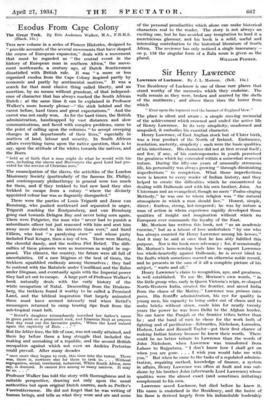Exodus From Cape Colony
The Great Trek. By Eric Anderson Walker, M.A., F.R.H.S. (Black. 15s.)
THIS new volume in a series of Pioneer Histories, designed to " provide accounts of the several movements that have shaped the course of European expansion," deals with a movement that must be regarded as " the central event in the history of European man in southern Africa," the move- ment northwards, a century ago, of Dutch frontiersmen dissatisfied with British rule. It was " a more or less organized exodus from the Cape Colony inspired partly by economic and partly by sentimental motives." It was a search for that most elusive thing called liberty, and an assertion, by no means without grandeur, of that independ- ence of character that has always marked the South African Dutch : at the same time it can be explained in Professor Walker's more homely phrase—" the stick behind and the carrot before, hard times and great expectations." And the carrot was not easily won. As for the hard times, the British administration, handicapped by vast distances and slow communications, and faced with complex problems, came to the point of calling upon the colonists " to accept sweeping changes in all departments of their lives," especially in matters of land, labour And security. In South African affairs everything turns upon the native question, that is to say, upon the attitude of the whites towards the natives, and the Boers
" held as of faith that a man might do what he would with his own, including the slaves and Hottentots the good Lord had pro- vided for the service of Christian men."
The emancipation of the slaves, the activities of the London Missionary Society (particularly of the famous Dr. Philip), and contemporary philanthropy in general were too much for them, and if they trekked to find new land they also trekked to escape from a colony " where the divinely appointed colour bar was so flagrantly disregarded."
There were the parties of Louis Trigardt and Janse van Rensburg, who pushed northward and separated in anger, Trigardt reaching the Zoutpansberg, and van Rensburg going east towards Delagoa Bay and never being seen again. There were Potgieter, the man who " never had to punish a subordinate officer but just reasoned with him and sent him away more devoted to his interests than ever," and Sarel Cilliers, who had " a paralysing stare " and whose party included Paul Kruger, then a boy of ten. There were Maritz, the cheerful dandy, and the restless Piet Retief. The diffi- culties of these pioneers were as numerous as might be sup- posed. The climate, the country, the future were all full of uncertainties. Of a race litigious at the best of times, the trekkers squabbled endlessly among themselves ; they had to contend with the Matabele under Umsilikazi and the Zulus under Dingaan, and eventually again with the Imperial power they had set out to escape. A large part of Professor Walker's book naturally deals with the early history of the white occupation of Natal. Descending from the Drakens- berg, the trekkers found it worthy to be called a Promised Land, and the biblical inspiration that largely animated them must have seemed intensely real when Retief's messengers returned to camp bearing ripe fruit from the sub-tropical coast belt.
" Retief's daughter triumphantly inscribed her father's name in green paint on a prominent rock, and Erasmus Smit at prayers that day read out his favourite psalm, ` When the Lord turned again the captivity of Zion. . . "
But the lekker levee, the life of ease, was not easily attained, and .there lay before them a long struggle that included the making and unmaking of a republic, and the second British occupation against which not even an Andries Pretorius could prevail. After many decades " once more they began to trek, this time into the towns. There was, there is, nowhere else for them to trek to. . . . Without segregation, social, territorial, industrial, White South Africa, men say, is doomed. It cannot live among so many natives. It may be so. . . ."
Professor Walker has told the story with thoroughness and in suitable perspective; drawing not only upon the usual authorities but upon original Dutch sources, such as Preller's Voartrelckermense. He did not forget that he was writing of human beings, and tells us what they wore and ate and some
of the personal peculiarities which alone Can make historical characters real to the reader. The story is not always an exciting one, but he has avoided any temptation to lend it a meretricious glamour, and his book is a solid, useful and interesting contribution to the historical literature of South Africa. The reviewer has only noticed a single inaccuracy— on p. 158 the singular form of a Zulu noun is given as the












































 Previous page
Previous page